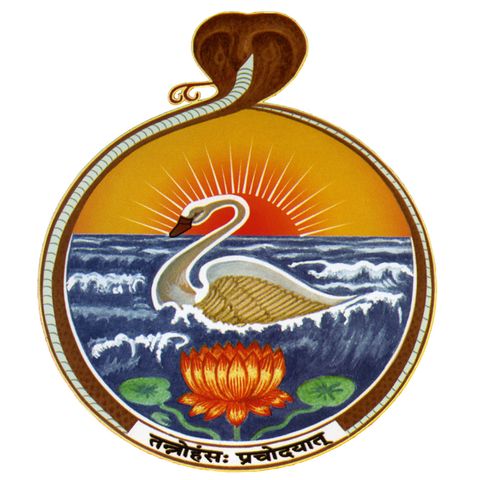Katha Upanishad 1 - Introduction | Swami Tattwamayananda

Download and listen anywhere
Download your favorite episodes and enjoy them, wherever you are! Sign up or log in now to access offline listening.
Description
This class was delivered by Swami Tattwamayananda on February 23, 2020 at Stanford University. The Stanford Hindu Students Association hosted the lecture. -Upanishads are the most profound and philosophical portion...
show more-Upanishads are the most profound and philosophical portion of the Vedas. Vedas are divided into four parts: Samhitas, Brahmanas, Aranyakas and Upanishads.
-Rigveda Samhita is the most ancient document of human spiritual aspiration. There has been an oral tradition of preserving the Vedas through the Guru-Shishya parampara.
-Kathopanishad belongs to Krishna-Yajurveda. It is one of the 10 Upanishads that are popular and that Shankaracharya wrote commentaries on.
-Kathopanishad is in the form of a dialog between a teacher (Yama, Lord of Death) and Student (Nachiketa). It has a story background and a deeper philosophical portion.
-In Vedic times, there were no temples or image worship. There were two types of religious practices: (1) Ritualistic and (2) Meditative. Under meditative practices, natural phenomena were used as points of focus and prayers were made for peace in all regions. The meditator would contemplate on the divine principle behind the natural phenomenon and the one Absolute Reality behind the entire cosmos.
-The story of Kathopanishad is discussed as below.
Vajasrabasa is performing a Vedic ritual. Under the ritual, he is supposed to offer all his possessions to needy people. His son Nachiketa observes that his father is only giving away discarded cattle. Possessed of Shraddha, Nachiketa asks his father three times: “To whom are you going to make a gift of me?” Annoyed at his question, his father replies: “I am going to give you to the Lord of death.”
To make his father’s words come true, Nachiketa goes to the palace of Yama, the Lord of Death. He has to wait there for three days without any food. Upon return, Yama grants him three boons. The three boons requested by Nachiketa represent three levels of human aspiration and evolution.
First Boon: When I go back, please ensure that my father will not scold me.
Second boon: After death, I should be able to enjoy a long life in heaven.
Third boon: When a man dies, some say he is; other say, he is not. Please teach me the truth.
In response, Yama explains to Nachiketa the nature of the Atman. He compares human life to a journey on a chariot. Atman is the owner of the chariot, body is the chariot, intellect is the driver, mind is the reins, senses are the horses and the sense objects represent the path. Just as horses should not dictate terms to the rider, so also, sense organs should not dictate terms to the mind.
Those who cannot control the senses do not reach the destination. If one focuses on material pleasures alone, then the smallest setback can be devastating.
-When we think of after-life, we become wiser in this life. When we know that all we care about will disappear, we develop spiritual common sense. We do not have to experience the transcendental to benefit from the idea of the transcendental – even an intellectual understanding influences our attitude.
-Many education programs are focused on immediate material benefits. There is no room for purification and sublimation of ideas for young minds. Mind also needs proper food. It is important to make mind and intellect fit instruments to guide our life and go beyond utilitarian values. If we can focus on unselfish activities that seemingly have no immediate tangible value, its indirect spiritual benefit can be enormous.
-The story of how Yajnavalkya got the Shukla Yajurveda is discussed. Yajnavalkya was asked to unlearn the Krishna Yajurveda, which he had received from his teacher, due to his arrogance. Later, he learned Shukla Yajurveda from Lord Surya. Kathopanishad and Taittiriya Upanishad belong to Krishna Yajurveda. Isha Upanishad and Brihadaranyaka Upanishad belong to Shukla Yajurveda.
Information
| Author | Vedanta Society, San Francisco |
| Organization | Vedanta Society, San Francisco |
| Website | - |
| Tags |
Copyright 2024 - Spreaker Inc. an iHeartMedia Company
